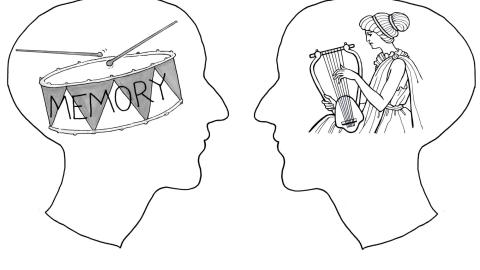How Our Minds Were Once Shaped By Poetry

Few now sing the praises of when poetry shaped us. Its history of molding minds is almost lost (it lasted till prose, and its logic, could last). That’s the unsung pretext of Plato’s poetry ban.
1.You and I are both, right now, using the “mostmomentous” technology ever (Ong). It changed thinking itself. All other tech needs it.
2. It’s hard to imagine life before the technology of text. But before alphabetic writing, poetry was the one way to store and share bulk information.
3. Poets sang their culture’s shared knowledge. “Metricalencyclopedias” provided “moraltraining” (Havelock). Poetry was school, library, entertainment… the Internet of its time.
4. The mother of all musesMnemosyne“symbolised not just… memory… as a mental phenomenon but…the total act of…memorializing”—>how poetry and music made “words…recollectable (beforewriting).
5. This might beat music’s evolutionary conundrum, perhaps it isn’t useless “auditorycheesecake” (Pinker), but an adaptive memory expander (music-assisted rhythmic storage of Homer’s 27,803lines).
6. Without text, what isn’t frequently repeated, islost. Nontext cultures still record what matters by setting repeated formulaic phrases to a beat. Your lyric memory and “earworms” testify to its effectiveness.
7. Rhapsody means “stitched together song,” and rhapsodic recall ruled most cultures (only ~106 of ~7,000 known languages have “literatures“).
8. Text-free cultures think differently, they’re concrete “image-thinkers,” with situational (vsabstract), aggregative (vsanalytic), and participatory (vsobjective) thinking patterns. We all start similarly, then learn text-centric thinking.
9. Plato felt poetry was “crippling [to] themind”—”Our eros for this kind of poetry” (meaning epic and drama) is a perilous “immaturepassion.”
10. Poetry’s effects were “the exact opposite of rationalobjectivity.” It transformed you by “mimesis”—you “becameAchilles,” absorbing his ethos. This mimesis was “essential toeducation,” butdangerous.
11. Plato saw how art could manipulate behaviorally dominant unreasonedemotions. Art usually glamorizes or ghettoizes something, even if unwittingly (see beauty vsduty). Plato grasped better than many now how emotions and reasoninteract.
12. Plato knew “the gods… have the character that the poets… givethem” (Gass), so he “waged the firstmedia war” (McLuhan). Philosophy needed “exotic new skills of abstract thought and objectivity,” which meant breaking oral-poetic thinking patterns.
13. Plato’s writing, often a “morass of interpretiveconfusion” (Goldstein), about writing is ambiguous—it weakened memory, couldn’t defend itself, but its “restructuring ofthought” was needed.
14. Sustained collaborative abstract thinking, indeed “logic itself emerges from the technology ofwriting.” You can’t “syllogize inimages.”
15. Our text-centricity pictures our minds in unsound ways. They’re built to resonate to poetry. Its memorable mind-formative phrases still matter more than many now think.
Illustration by Julia Suits (author of The Extraordinary Catalog of Peculiar Inventions) modified by Jag Bhalla (using Lyre Clip Art from vector.me, by papapishu).





